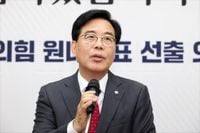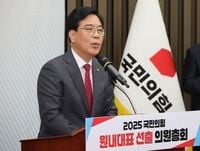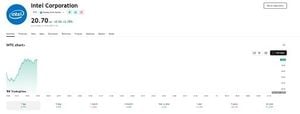On June 16, 2025, Song Eon-seok, a three-term lawmaker from Gimcheon, Gyeongbuk, was elected as the new floor leader of South Korea's People Power Party (PPP), marking a significant moment for the opposition party in the wake of the recent presidential election loss. The election, held at the National Assembly in Yeouido, Seoul, saw Song secure 60 out of 106 votes in the first round, decisively beating rivals Kim Seong-won and Lee Heon-seung, who received 30 and 16 votes respectively.
Song, 62, is widely regarded as an economic expert within the party, having served as Vice Minister of Economy and Finance and as head of the Budget Office during the Park Geun-hye administration. His experience also includes two prior terms as floor leader and chairmanship of the National Assembly's Planning and Finance Committee. Despite being classified as part of the pro-Yoon Seok-yeol faction, Song is considered relatively non-factional, a trait that helped him garner support beyond his base in the Daegu-Gyeongbuk (TK) region, where 65% of the party’s regional lawmakers reside.
In his acceptance speech, Song acknowledged the heavy burden he now bears, stating, "We are an opposition party that has lost power and a definite minority party, and I know its limitations better than anyone." He emphasized the need for change and innovation, warning against regressive actions tied to the past and urging the party to focus on the future and the people. "We need change and innovation, and it is terribly wrong to engage in regressive actions of the past; we must only look to the future and the people," he declared.
Song proposed the swift establishment of a reform committee to steer party innovation, promising that the committee would be formed within days after gathering consensus. He also pledged that individuals known for factional bias would not be prioritized in the upcoming leadership selections. Moreover, he called for an expedited national convention, underscoring the importance of having a leadership directly elected by party members and the public to ensure stability and legitimacy.
The election of Song Eon-seok signals the continuation of the pro-Yoon faction’s influence within the PPP, a development that complicates the tenure of Kim Yong-tae, the head of the party's emergency response committee. Kim, a reformist figure born in the 1990s, had proposed a set of 'Five Major Reform Proposals,' including the nullification of the party’s stance opposing former President Yoon’s impeachment, and advocated for a September national convention. However, with Song’s victory, Kim’s position has become precarious. On the morning of June 16, Kim announced that he would resign regardless of the outcome of any party member poll on reform proposals, signaling an impending end to his role.
Political analysts note that Kim’s reformist agenda, while impactful in terms of raising awareness, is unlikely to be fully embraced under Song’s leadership. The new floor leader expressed reservations about pushing forward Kim’s reform proposals, suggesting that some party elders found aspects of the reforms difficult to accept. Song indicated that these issues would be discussed by the reform committee, reflecting a cautious approach.
As the first floor leader since the inauguration of President Lee Jae-myung’s government, Song faces the daunting task of leading a 107-seat opposition party that is currently unable to block the ruling Democratic Party’s legislative agenda. The party’s approval ratings have plummeted to 21%, according to a Korea Gallup poll conducted on June 13, 2025, underscoring the urgency for internal reform and effective opposition.
Song’s responsibilities include managing negotiations with the dominant ruling party, overseeing internal party reforms, and preparing for the upcoming national convention. Observers anticipate a hardline stance from Song in legislative negotiations, particularly concerning controversial bills such as the Commercial Act revision and the confirmation hearings for Prime Minister nominee Kim Min-seok.
Kim Min-seok’s nomination has been mired in controversy, with allegations of irregularities in political funding, questionable asset increases despite reported debts, and concerns over his academic credentials from Tsinghua University. The PPP has focused on these issues during the confirmation process, highlighting the need for thorough scrutiny. Kim Min-seok has denied wrongdoing, asserting that all political fund-related fines and debts have been fully paid and that his son did not use legislative achievements for university admissions. The Democratic Party has shown mixed reactions, with some members defending him while others express concern. The confirmation hearings are expected to extend beyond the typical duration to adequately address these allegations.
Meanwhile, President Lee Jae-myung and First Lady Kim Hye-kyung departed for the G7 summit in Canada on June 16, 2025, marking their first overseas trip and multilateral diplomatic debut since taking office on June 12. Despite the short preparation time of just 12 days, the invitation to the G7 reflects Korea’s rising status as an economic powerhouse and the international community’s expectations for the new administration. The summit is seen as a critical opportunity for Korea to reassert its diplomatic presence after a six-month hiatus caused by the impeachment of former President Yoon.
The presidential delegation’s itinerary includes bilateral meetings with G7 member states and invited countries such as Australia, India, and Mexico, focusing on trade, energy supply chain diversification, AI integration, and regional security issues including the ongoing war in Ukraine and North Korea’s provocations. The presence of Lim Woong-soon, recently appointed as the 2nd Deputy Director of the National Security Office and former ambassador to Canada, has facilitated the rapid logistical preparations for the summit.
President Lee’s approval rating currently stands at 58.6%, a figure the presidential office attributes to public expectations for normalization of state affairs and restoration of democratic governance. Support is strongest among residents of the Honam region, individuals in their 40s and 50s, and blue-collar workers. However, the disapproval rating remains at 34.2%, highlighting the need for targeted efforts to address public concerns, particularly regarding employment opportunities for younger generations and ongoing political investigations.
Within the Democratic Party, attention is turning to the upcoming party leadership election scheduled for August 2, 2025. Four-term lawmaker Jeong Cheong-rae has declared his candidacy, emphasizing President Lee’s name 33 times in his five-page declaration, signaling strong alignment with the president’s agenda. Former floor leader Park Chan-dae is also considering a run. The election process now heavily weighs the votes of party members, who constitute 55% of the total vote, diminishing the influence of delegates and making the outcome more reflective of grassroots sentiment.
On the conservative side, former Daegu Mayor Hong Joon-pyo is poised to return to Korea after a month in Hawaii, where he reflected on his future role in the nation’s politics. His return is expected to shake up the opposition landscape, with speculation about whether he will rejoin the People Power Party, join a reformist new party, or launch a new political entity. Similarly, former party leader Han Dong-hoon is actively engaging supporters through live broadcasts and encouraging party membership, signaling his intent to contest the upcoming national convention. Analysts suggest a potential political alliance between Hong and Han could reshape conservative politics in South Korea.
Lastly, President Lee’s son recently held a private wedding, attended by close friends and political figures, including Democratic Party floor leader Kim Hyeon-jeong. The event was marked by stringent security measures and emotional moments, with President Lee reportedly moved to tears during his congratulatory remarks, acknowledging the challenges faced by families of high-profile politicians.
As South Korea navigates a complex political landscape marked by party realignments, leadership contests, and diplomatic engagements, the coming months will be crucial in defining the direction of both the ruling and opposition parties. The leadership of Song Eon-seok in the People Power Party, President Lee’s diplomatic initiatives, and the unfolding political contests within both major parties will shape the nation’s trajectory as it confronts domestic challenges and global uncertainties.

![[정치ON] 이 대통령, G7 출국...국민의힘, 새 원내대표 송언석 의원 선출](https://thumbor.evrimagaci.org/2HzWUitD0gIcn6AkWnRicy4jZBY=/200x0/tpg%2Fsources%2F1e29d76a-fcd1-4b62-a7cc-0e2bced2eb53.jpeg)




